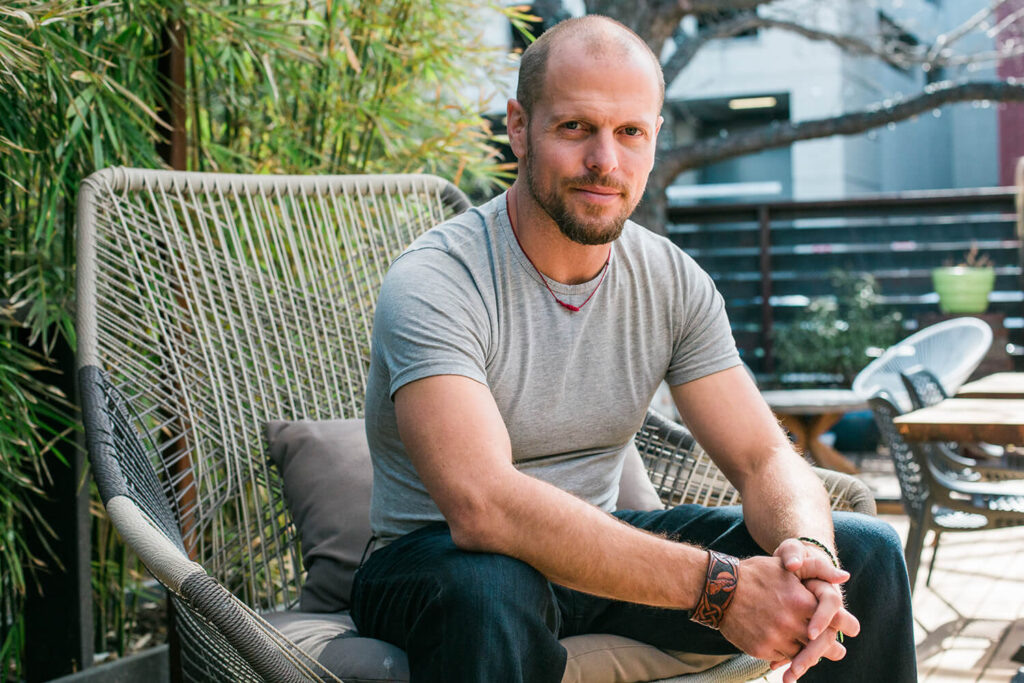At my lowest point, I was mopping floors at a gym in Northern Los Angeles for $8/hour.
My family called me a “loser,” people criticized my goals, and several times, I almost gave up.
But with no other choice, I kept going and spent YEARS learning, taking risks, failing, rejecting the “typical” path, failing some more, and investing time and money I DIDN’T have.
Today, I run a remote business while traveling the world full-time.

While some experts make it seem you have to be Richard Branson, Warren Buffet, or Bill Gates to have the “career of your dreams,” ultimately, I think what many want is just to do what we enjoy, live well, and have the freedom to make the most of our lives…
…and that’s “pretty damn good” in my book.
I’ll explain the 12 game-changing lessons that revolutionized my work so far — ones I wish I knew before — and I’ll show how they can help you build a pretty damn good career too.
- The unusual career strategy that can open infinite opportunities
- Job advice from the Dalai Lama
- Struggling with your career? Read this
- The TWO tiny words that changed my career (and life)
- My favorite advice from Tim Ferriss
- How to rapidly rise in any career field
- How to get AMAZING career advice
- How to find a career you LOVE
- What to do with your opportunities
- My biggest regret (and why you should avoid it too)
- Why “success” can be destructive
- The biggest lesson of all
1. The unusual career strategy that can open infinite opportunities
The “traditional” approach to careers is something like this:
Pick what you like → get a degree in it → find a job in it → rise the ranks
But what if you don’t know what you love? Or what if you love a lot of different things? What if your tastes, uh, change?
From finance to fitness to writing to marketing to compliance, I’ve changed careers several times during the past decade. Sure, I enjoyed each one — and worked my ass off to become the best I could — but I changed paths after discovering ones I liked even more.
That’s why I believe “traditional” career advice is kind of backwards.
The reality is, as you pursue a goal, new things will open up that might take you places you never imagined and uncover new things that you prefer.
Katharine Brooks, one of the top career counselors and the author of You Majored in What?, explains an unconventional approach to careers where it’s less like the straight-line, “traditional” path and more like “the Butterfly Effect.”

Here’s what that means:
As you go along in your career, seemingly tiny, insignificant events and experiences that happened earlier might blossom and create big, new paths and opportunities.
While others (and my parents) may disagree, I feel it would be too restrictive if I could only do one thing for the rest of my life. There’s so much to try, why limit myself?
For example, teaching English in South Korea after I graduated unlocked infinite experiences I never knew existed, transforming what I thought was possible, shattering my old perspectives, and changing my goals and identity.
Up until that point in my life, I never even considered traveling as a major part of what I wanted to do. (In fact, before then, I barely traveled at all!)
Afterward, it became a HUGE part of my life: I’ve relocated to many countries and, currently, I’ve been traveling throughout Europe for 10 months and counting.
When I was starting out, I didn’t have a big enough frame of reference to know what I liked!
I didn’t know what I didn’t know.
Of all the things I did when I was just beginning my career, the thing I appreciated most was I said YES to many different opportunities I would’ve said NO to previously.

After all, who I was at 21 — and a fresh college graduate — is NOT who I am now.
The more I learned and experienced, the better decisions I made.
Embrace serendipity. If you get an opportunity and it seems interesting, give it a shot for a little bit and see what happens. (Or even suggest an idea to your current employer!) The worst that happens is you don’t like it and you stop.
The best that happens? It transforms your life.
2. Job advice from the Dalai Lama
In April 2011, I moved to Sydney, Australia, to start an unpaid internship at an investment bank. But that company lied to me, misrepresented themselves, and ruined me within my first week in the country.
It sent me scrambling, desperately searching for another opportunity while I was racing against the clock of my short-term visa.
Finally, I found a different stock brokerage, worked there for a month (unpaid), and was about to get sponsored for a work visa…
…before Australia changed their rules on 1 July and destroyed my work visa application.
Days later, I flew back home to LA, heartbroken, devastated, and depressed.
But believe it or not, that was one of the best things that ever happened to me.
Because around that time, I stumbled on a quote that reinvented how I saw my failures:
Remember that sometimes not getting what you want is a wonderful stroke of luck.
— dalai lama

Whenever opportunities closed, I could see they eventually worked for the best.
Looking back on it, it was only by getting kicked out of Australia that I came back to the US and launched a career in my passion of health and fitness, which unlocked countless opportunities to become a writer and eventually do what I do today.
In your career, you might have to encounter some hardship, failure, or (God forbid) catastrophic disaster. But in those moments, I hope this quote gives you some comfort.
And suggests that, maybe, it really could work in your favor.
At the time I left Sydney, I was panicking; but in hindsight, it was a wonderful blessing.
And now with the COVID-19 global economic crash, it’s the perfect opportunity to remind myself that, maybe, this is exactly what I needed.
3. Struggling with your career? Read this
In the summer of 2012, I was the janitor at a gym.
Less than three years later, I wrote for Muscle & Fitness, Men’s Fitness, and Men’s Health and had a growing freelance marketing business.
I worked hard for it: I wrote all day long, every day, and was usually the last person working at a coffee shop when it closed at 11pm. (Then, I’d go home to write more.)

While I loved it, it was also because I had to succeed. There was no other option.
I had to prioritize my career and become super productive because it was affecting every other area of my life: Mental health, physical health, financial health, emotional health, etc.
Here’s my belief is this:
If your career is struggling, temporarily make it your NUMBER-ONE PRIORITY.
During my tough times, I made sure to do my work first, before almost anything else. I sacrificed my weekends, didn’t party, didn’t play video games, and didn’t watch TV.
While hanging with friends is fun, you’re not going to care about it a few days from now.
Put the other things in life on the back burner and focus on your career, at least until it’s in a better place. (I’m not saying you should never see your friends again; I’m just saying that you might consider postponing a few hang-outs until your career improves.)
Even now, I’ve met a lot of people want their dream career, but they keep themselves “busy” with all kinds of distractions while their career suffers.
Just making this simple switch in priorities can free up your time so you can focus on doing whatever it takes to address one of the single biggest areas of your life.
What if you don’t know where to start?
Here’s what always worked for me:
Go somewhere at least an hour away from your home. Find a nice place to spend some time alone with your thoughts, write, and let whatever’s inside come out.

Creating space and eliminating distractions can give you an opportunity to look inside and see what you might like. (Oftentimes, when I meet someone who doesn’t know what they want, they’ve never given themselves time to do this.)
Then write some ideas and, later, I’ll show you how to see if they’re right for you.
4. The TWO tiny words that changed my career (and life)
By September 2011, I was losing hope with my life.
I had just spent the previous two years, traveling throughout Asia while teaching English and living in Australia, where I was screwed (which I mentioned earlier).
I felt (falsely) like I had nothing to show for it and I was struggling to find a job.
One night, I met up with some high school friends. When they asked about my plan after returning to LA, I said I would work in finance (which I majored in) and eventually transition into fitness (which was my passion), but only after I built a career in finance.
I’ll never forget what a friend politely asked me:
“Why wait?”
I paused. No one ever asked me that. “You’re right,” I said.
And shortly after, I decided to abandon finance and start studying for my Certified Strength and Conditioning Specialist exam.
I AM SO GRATEFUL I DID THAT.
What was I waiting for?! The “right” moment? The stars to align?
I would’ve been spinning my wheels in the WRONG direction, pulling myself further away from what I REALLY wanted to do in life.

I often hear people say something like what I said. “I’m going to do XYZ for a few years AND THEN I’m going to quit and finally do what I really love.”
Well, why don’t you just do what you really love RIGHT NOW? If you’re going to do it later, you might as well do it now and save time.
(There’s a very real possibility you might not even like it after you try! So you might as find out NOW, before it’s too late.)
Life is short. I believe nothing justifies wasting precious time on stuff I don’t care about.
Waste time and time will waste you.
— anonymous
Take it from me, if you’re afraid to make the leap, I understand. But once you admit you’re afraid, you can work on overcoming it.
Even better, taking action now is the equivalent of hitting a “warp-speed button” on your life. You might not be ready for it right now, but you’ll find a way and open up more opportunities than if you never acted. (Again, the Butterfly Effect in action.)
5. My favorite advice from Tim Ferriss
The Four Hour Work Week, by Tim Ferriss, taught me many life lessons, but here’s my favorite:
“Don’t ask for permission, beg for forgiveness.”
If you want to do something in your career (or life), instead of getting other people’s approval, JUST DO IT FIRST and handle any disapproval LATER.

The best things in my career happened when I went after what I wanted without asking for anyone’s permission.
I chose to become a personal trainer AND THEN told my parents who were tremendously opposed to the idea. They called me every terrible, nasty thing in the book not only to discourage me from doing it, but also to break my spirit and self-esteem.
They said I was wasting my life, wasting my college education, and that I was a “loser.”
But that’s why I told them AFTER I made my choice, not before; because if I did it before, it would have made it harder to act in the first place.
I know people who, whenever they have an idea about a new career path, ask all their friends and family, “What do YOU think?”
But no one will ever give you permission to do what you want in life.
Have conviction. Go after what you want. And if people have a problem with it later, THEN you could ask for forgiveness. But don’t let them stop you from living your dreams.
6. How to rapidly rise in any career field
Forget Apple, Amazon, or Google.
The best stock on earth is looking at you in the mirror: Invest in yourself and you will always reap massive rewards and dividends. (And maybe invest in Apple too, haha.)
Read books, attend seminars, take courses, meet mentors, and get GOOD at what you do.
I’ve started several careers with no previous experience, but committed myself to learning TONS of information and practicing endlessly until I started getting good.
While it’s often taught that you have to “get a degree” to be “qualified,” nothing beats real-world experience and getting knowledge from the experts in your industry.
Here’s the great news for you:
Most people do not do this so it won’t take long to outperform them!
If you haven’t read hundreds of books, you are functionally illiterate, and you will be incompetent, because your personal experiences alone aren’t broad enough to sustain you.
― General Jim Mattis
Even if you’ve been doing it for a long time or are just starting out, I also recommend “shadowing” experts in your desired industry.
In 2012, after getting my personal training certification, I was about to just get a basic trainer job at a commercial gym like 24 Hour Fitness or LA Fitness.
But the books I read and the mentors I talked to recommended that I postpone getting a job and, instead, prioritize learning over money in the beginning of my career.
It was a tough decision — one that my parents bitterly criticized (“I would rather you flip burgers at McDonalds!” my Mom screamed at me) — but I decided to get an (unpaid) internship at one of the top fitness facilities in Southern California for three months.

Those three months taught me more than I could’ve learned in three years doing it myself.
And once I finally became a trainer, it gave me a HUGE advantage over others, even those who did it for years, and even helped me achieve success in fitness writing.
Learn in your 20s, earn in your 30s.
— Keith Ferrazzi, author of Never Eat Alone
Finally, here’s another great way to learn: Challenge yourself at work.
Take on bigger projects. Pitch ideas to your boss. And ask a lot of questions.
In fact, once a job starts getting “easy,” I leave as fast as I can.
If you are the smartest person in the room, then you are in the wrong room.
— confucious
I don’t want a job I can “do in my sleep.”

For example, I write ethics and compliance training for large companies. While most people have no idea what that is (or think it’s super boring), I actually find it extremely fun and challenging. I have to think in completely different ways and constantly invent new solutions — by the end of the day, my brain is fried in an awesome way.
I want a job that challenges me because it forces me to grow and gives meaning to what I do.
And that’s usually a requirement for a “pretty damn good career.”
7. How to get AMAZING career advice
This tip, by itself, can save you years of hardship and going in the wrong direction.
Only learn from people who’ve done what you want to do.
Recently, I was on a webinar with Tucker Max, a 4x New York Times bestselling author, about writing books. He was help a woman with her idea when she said, “Oh, I just saw in the chat someone suggested to break it into separate books. That sounds like a good idea.”
Tucker’s immediate response:
“DO NOT do that! That is the WORST thing you can do! Don’t listen to anyone in the chat: They have no idea what the fuck they’re talking about!”
And he’s right! No one in that chat ever wrote a successful book. That’s why they were there!
Do not get advice from people who have no idea what the fuck they’re talking about.
Ask advice from people who’ve done it successfully. Chances are, if you ask nicely, they’ll help you. I’ve emailed dozens and dozens of people and have gotten more wisdom than I could’ve ever imagined.

Also, only get advice from people you would want to switch places with.
When I started personal training, I asked advice from other “successful” trainers. But I didn’t notice if they had mediocre lives, personalities, or integrity.
Look deeper. Who are they as a person? What are their lives like? Are they happy? Stressed? Fearful? Arrogant? Humble? Kind?
There are some who are “elite” at their work, but lack character or integrity.
But when you find a mentor who is as “successful” as they are “a great person,” it’s like magic. Look at the whole body of work and you’ll be able to get super valuable career advice.
8. How to find a career you LOVE
The sad truth is many people spend years of their lives dedicated to a career path only to discover, once they achieved it, they hate it.
Worse, because of the “sunk cost fallacy,” a lot of people will struggle to make a change because they’ve invested so much of their time, regardless of how much they hate it.
Fortunately, if you’re thinking about a career change or exploring something new, there’s an easy way to find out whether you’d like it within a few days.
Find at least 3 – 5 people in that industry and talk to them.
Ask them what they think about it. Ask them what their day is like. Ask them their likes and dislikes. Ask them what it takes to succeed.

Years ago, when I wanted to be a strength and conditioning coach for college and professional athletes, I reached out to DOZENS of high-level coaches.
But after my research, I realized I DIDN’T want that career.
I would’ve wasted months — even years — chasing something I would’ve disliked, but thanks to a few emails and calls, I made a well-informed decision to avoid something unpleasant.
Here’s how you can start:
Go on LinkedIn, find first, second, or third connections in your target industry, send messages, and be very upfront and polite: Tell them that you found them because you’re interested in their career and just want to ask some questions to see if it’s a good fit.
PEOPLE ARE SUPER OPEN AND FRIENDLY ABOUT THIS.
Hop on the phone or take them out to coffee and have a great conversation.
9. Crush your opportunities
When I was just starting out as a writer around 2013, I contributed articles to a men’s lifestyle site owned and operated by a friend and mentor.
He gave me countless opportunities to show what I could do and I took advantage of every single one. I worked my ass off for him (for free) and he rewarded me in amazingly kind ways, introducing me to connectors, editors, and mentors.
In life, you’ll get chances…
It’s what you do with them that makes all the difference.
(At the risk of sounding like an Eminem song, you only have one shot… do not miss your chance to blow… this opportunity comes once in a lifetime…)

I’ve spent countless hours on just one single email because I knew how important it could be in my life. I spent over 30 hours writing my first-ever article for AskMen.com because I realized it was a tremendous opportunity.
And they led to many MORE opportunities.
Sometimes, you only get one chance. So when you get your shot — whether it’s a freelance job, a job interview, a work project, etc. — put in the work and go the extra mile.
But I’m not talking about three or four hours…
…I’m talking about 30 or 40 hours.
For example, if you have a job interview, don’t just spend “a couple hours” thinking about your answers. Videotape yourself. Memorize your answers. Ask a friend to ask you questions and videotape yourself as well. Then watch it and try it again and again.
Regardless of how established or new you are, the results can be exponential.
10. My biggest career regret
Like most people, I worked a job I hated.
I could say my biggest regret was to NOT quit earlier — but that’s actually not it.
MY BIGGEST REGRET WAS I WISH I HAD A BETTER ATTITUDE.
When I say attitude, I don’t mean I should’ve “tried harder.” (I tried VERY hard, harder than other trainers, and invested thousands of dollars into becoming the best I possibly could — and I STILL struggled.)
It’s that I hated the company culture and how negligent trainers were GIVEN clients because they were great salesmen and saleswomen — AND IT SHOWED.
I was bitter at other people’s success, I was irritable, and I just wasn’t having a good time.
While some of my resentment and frustration was valid, the only person I was hurting was myself. I simply didn’t have to show it that badly.
Everyone else noticed — trust me.

Would it have improved my sales? Probably not, honestly. But it would have improved my sanity — and that’s worth something.
Also, when I was screwed over (several times) in my career, I held on to my anger towards those people for much longer than I probably should’ve.
(Maybe a part of Past Anthony just liked feeling like a victim.)
Please learn from my mistakes: Don’t hold a grudge. Because at the end of the day, the only person it hurts is yourself and it holds you back from living the way you want.
Take more responsibility over your career situation and you’ll reap the emotional benefits.
11. Why “success” can be destructive
Unlike many bloggers, I want you to do things for the RIGHT reasons, not just ANY reason.
There’s nothing wrong with wanting to create a million-dollar business, become president at a company, or just work 4 hours/week on a project that pays all your expenses.
But before you go on the long and arduous journey of making it happen, it’s valuable to take a moment to look inside and ask why you’re doing it in the first place.
One of the biggest issues is that many people are working to make “enough money” to do what they want. But there is absolutely no idea about what “enough money” looks like.

So they end up working more than they want because they’ve never made a finish line.
One of the best tips I got from The Four Hour Work Week was to define what your ideal lifestyle will look like, factor in the expenses, taxes, saving, etc., and determine how much money you ACTUALLY need to support it.
Often, it’s FAR lower than some people assume and it gives a real target to work toward.
Next, dig deeper and think about your own career motivations.
I’ve met many entrepreneurs and business owners who are AMAZING people and I can see exactly why they’ve attained the success that they have.
But I’ve also met a lot of “very successful” people who had questionable motivations.
Some were continually trying to prove themselves, prove that they’re not with a used to be, or prove that they are someone who they really not.
Worse, a few were arrogant, full of themselves, and mean to people “beneath them,” and they believed were “better” than others who weren’t as successful in business.
Some even used work to distract themselves from deeper emotions.
I’ve heard comments like, “I don’t want to date right now because I’m focused on my career.”
Like I said earlier, if your career is struggling, then yeah, that’s good in the short term.
But if someone is always putting off relationships (or whatever) to focus on their career — especially if their career is in a good place — there might be a possibility they’re just using “work” as a crutch to avoid dealing with deeper problems.

Don’t pursue a career to just to make someone happy, prove yourself worthy, beat someone else, become famous, or hide. No amount of accomplishments, revenue, or “financial security” will ever satisfy any inner lacks or insecurities.
No matter what you do in life, do it with tremendous integrity and love.
Do it because you want to. Do it because you love it.
I’m definitely not “perfect:” I’ve made plenty of mistakes too.
But that is the only way to have a successful career that I know.
12. The biggest lesson of all
For all the things that I “accomplished” (purposely put in quotations) in my career so far, I benefited from the help of many kind, supportive, and generous people.
Yes, I worked hard. Yes, I put my (literal) blood, sweat, and tears into my craft. But a lot of it would be far less effective if it wasn’t for the people who’ve helped me either personally or even indirectly through their teachings.
So here’s my FINAL lesson:
Express gratitude and humility.
More importantly, make a sincere effort to thank each person who supported you.

I cannot begin to describe how grateful I am for every single person, thing, and event I’ve experienced — good and bad — which pushed on my path.
For all your accomplishments, please do not — for one second — I think that it was “all you.” (This fallacy, by the way, is known as the “fundamental attribution error.”)
Heck, just the fact that I was born in my particular country, city, and socioeconomic level is a significant advantage.
The more I learn, the more I realize I know nothing.
And all the more reason to be thankful for everything.
Wishing you the best in your long, rewarding career.
[…] In July 2019, I left the States and have been traveling the world while running my business. […]